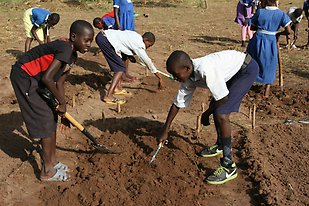Workshops at Healthy Urban Childhoods
Workshops at Uppsala Health Summit offer and require intense work with co-delegates from a wide range of professional fields and with different roles in society. Together, you will develop suggestions that will contribute to the well-needed implementation of research and innovations for better global health.
- A: ECHO-zones in practice: How to deliver evidence
- B: Listen to the kids!
- C: Supporting children’s mobility in complex urban contexts
- D: City gardening and farms for learning and well-being
- E: Measuring segregation and child health
- F: Social inclusion and empowerment in urban planning
- G: Indicators for children’s built environment
- H: Nature play enhanced with digital elements
- I: Industry-academy collaborations for healthy brain functions through physical activity

The desired outcome of this workshop is to examine and develop the ECHO (Ending ChildHood Obesity) zone as a means to achieve sustainable prevention of childhood obesity in an urban setting.
The number of children with obesity is rising rapidly globally with related complications including type 2 diabetes appearing already in young children and adolescents. Population-based intervention studies typically show that some overweight children reduce their body mass index (BMI) following interventions, others show no change and others increase their BMI. Therefore, at the population level, little or no effect is observed and no sustained reductions have been achieved. In response to this challenge the concept of Ending ChildHood Obesity (ECHO)-zones was developed at the Uppsala Health Summit on Ending Childhood Obesity in 2016.
The ECHO-zone approach is a town or community where multiple stake-holders in society have committed long-term (> 10 years) to initiate an environment around the child where actions promoting a healthy lifestyle focusing on food, physical activity and sleep habits are developed. In the ECHO-zone all children are invited to participate and followed individually over time during the intervention. Data is collected repeatedly from the children to describe changes in environment (by questionnaires) and biology (in blood samples). The measurement of effectiveness of different interventions is evaluated and is based on data showing how children respond to the intervention. In this way the ECHO-zone will build evidence i.e. facts to act on of how different interventions are effective in children depending on environment and biology/heritage of the child.
Since Uppsala Health Summit 2016 cities have started to work according to this concept. In this workshop, persons working with ECHO-zones in different parts of the world will share their experiences. We invite decision-makers from different areas of society to participate in this workshop, e.g. urban planning, schools, education, healthcare and non-governmental organizations to join the workshop, together with policy-makers and opinion-builders setting goals and the frameworks for these activities in society.
The discussions in the workshop are centered on these questions:
- What components define an ECHO-zone?
- What are barriers to creating sustainable ECHO-zones?
- How do we make healthy choices the easier choices for children in an urban environment?
- How would it be possible for us in our region to build evidence for essential components of an ECHO-zone?
- How can evidence building of ECHO-zone be translated into sustainable goals?
Inspirational Speaker:
- Erkki Välimäki, Director of City Development, City of Seinäjoki
Workshop prepared by:
- Peter Bergsten, Professor at Department of Medical Cell Biology and at Department of Women's and Children's Health, Uppsala University
- Kerstin Strandberg Wilbrand, Project manager at Division for Contract Education, Uppsala University
- Lena Sundberg, Project manager at Division for Contract Education, Uppsala University
- Audrey Niemann Jönsson, ECHO-zone coordinator (Sweden), Uppsala University

Foto: Maria Nordström
How to take children seriously in urban planning, management and design for a better and healthier environment.
When children are involved in planning of urban areas, it increases their commitment to civic participation and help to promote greener, healthier living spaces for people of all ages. But in reality, children are often left out of decisions about their environments.
The expected outcome of our workshop is a set of strategies that can raise awareness among make decision makers and within different sectors within urban planning, around their role and possibilities to proactively work for children's rights, needs and competences in urban planning.
By participating in planning processes that concerns their own environment, children develop trust to society, as well as in their own skills and knowledge.
In public discussion, children are sometimes seen as yet another interest group. It is important to remember, however, that because they are children, participation also matters for their healthy development and wellbeing.
“Listen to the kids!” means taking children’s knowledge and experiences seriously and acting on that information. A point of departure for the workshop is that the information children want to share shall be considered in decisions that affect children´s health and well-being both physically, socially and mentally. When it comes to the concerns and viewpoints about their outdoor urban environments, it is particularly challenging to communicate the information to all those concerned with planning, designing and management in a way that is manageable in their different practices.
The workshop addresses the participants own experiences of listening to children in different cultural contexts and of different ages as well as experiences of implementing that information in practices, leading to actions that promote children´s health and wellbeing in the urban environment.
Inspirational Speaker:
- Mara Mintzer, Co-founder and current program director of Growing Up Boulder, University of Colorado.
Workshop prepared by:
- Kerstin Nordin, Lecturer Landscape Architecture, Department of Urban and Rural Planning, Swedish University of Agricultural Sciences
- Maria Nordström, Associate professor in Environmental Psychology, Swedish University of Agricultural Sciences

The desired outcome of this workshop is the development of strategies for supporting children’s mobilities in urban contexts and the enablement of experiences sought through mobility.
We will depart from the complexity of children's mobility in urban contexts and share thoughts on and experiences of how to support children's varying ways of being mobile, such as roaming, "just" walking, and (kick) biking, and how this can also include time and space for quiet reflection and withdrawal for stress recovery. We will discuss the varying and changing characteristics of children's mobility in cities and how these are being supported in different geographical contexts. This includes discussing examples of how the urban environment and planning context can support the diverse ways of children being mobile.
The workshop discussion will be guided by the following questions:
- What kind of urban environments support versus hinder children’s different ways of being mobile?
- What are the ‘good’ examples, and what can we learn from them?
- Which other factors contribute to the support of children’s urban mobilities?
- How can these other factors be addressed in policy, planning and work related to promoting children’s mobilities?
Inspirational Speakers:
- Dr. Tim Gill, Independent scholar, advocate and consultant on childhood: https://rethinkingchildhood.com
- Marianne Labre, Program Director for Ghent - child- and youth-friendly city
Wokshop prepared by:
- Danielle Ekman Ladru, Associate Professor in Geography and Senior Lecturer in Child and Youth Studies at Department of Education, Uppsala University
- Tanja Joelsson, Senior Lecturer in Child and Youth Studiesat Department of Education, Uppsala University
- Terry Hartig, Professor in Environmental Psychology at the Institute for Housing and Urban Research, Uppsala University

The goal of this workshop is to define the stakeholders that can support children's access to outdoor education through school gardens and city farms, and how to translate plans into action.

Many children in urban areas grow up with limited access to the living landscape. Research results show that outdoor education and physical activity have positive effects on children’s learning as well as physical and mental health. There are good examples of outdoor educational activities such as school gardens, where children learn how to grow their own vegetables and 4H farms, where children meet with farm animals. In such activities, children learn about the ecosystems, how food is produced and how to interact with nature. How can we provide these creative learning environments for more children in urban areas? Space is a restricted resource and economic and social aspects limit the possibilities. Still, society gains a lot of fostering healthy individuals that grows into responsible adults favouring an evolvement of a sustainable environment.

Considering the limited space in growing cities, and the challenges to reach out to all socio-economic layers in the city, which are the key factors for establishing sustainable city gardening and farms? And which are the key challenges to consider, and stakeholders to involve.
The focus areas for the workshop
- Who are the stakeholders with the power to influence the development of cities and systems where active outdoor education in an eco-health context are provided for all children?
- How can the creation and continuity of pedagogical outdoor environments favouring children’s learning and wellbeing be facilitated? What is needed to meet this goal?
Inspirational Speakers:
- Mr. Kemo Kinteh, Future in our Hands, Gambia
- Dr. Henrik Lerner, Senior Lecturer, Dept. of Health Care Sciences, Ersta Sköndal Bräcke University College, Sweden
- Sharon Danks, Environmental city planner and Founder and Executive Director of Green Schoolyards America.
Workshop prepared by:
- Karin Artursson, Scientific Coordinator, National Veterinary Institute and Adjunct Professor in One Health at Department of Biomedical Sciences and Veterinary Public Health, Swedish University of Agricultural Sciences
- Bodil Dahlman, Landscape Architect and Lecturer in landscape architecture at Department of Urban and Rural Development, Swedish University of Agricultural Sciences

The purpose of this workshop is to discuss and take inventory of variables and aspects needed to be considered when measuring child health inequalities in urban contexts.
Is it possible to create an index of urban child health, using data available in Sweden as an example, that provides a fair representation of children’s well-being? Would the same indicators be useful in other settings? If that is the case, it would enable international comparisons and allow us to track improvements in child health over time. The expected outcomes of this workshop is a validated index that can be tested in diverse contexts.
The United Nations’ Sustainable Development Goals (SDGs) launched in 2015 emphasize equity and social justice as essential elements to achieve a viable future. The realization that sustainability, equity and freedom are all equally important elements for humankind’s survival has been highlighted by the International Panel on Social Progress (IPSP), something that is highly relevant in the rapid urbanization that is currently going on around the globe. Children are not only our future, they also represent a vulnerable population that needs special attention.
Inspirational Speakers:
- Dr. Charlotte Johansson, Sweden’s anti-segregation agency: Delmos
- Dr. Graham Alabaster, Chief, UN-HABITAT
Workshop team:
- Mats Målqvist Professor at Department of Women's and Children's Health, Int. Maternal and Child Health (IMCH), Uppsala University
- Helena Svaleryd, Professor, Department of Economics, Uppsala University
- Johan Dahlstrand, Operations manager, SIGHT - Swedish Insitute for Global Health Transformation
- Per Kåks Clinical Assistant at Department of Women's and Children's Health, International Maternal and Child Health (IMCH), Uppsala University

The anticipated outcome of this workshop is a list of points to consider when involving disadvantaged youth in the urban planning cycle - prior to as well as during planning and implementation processes of improvement, regeneration and development of new residential and commercial areas - in order to ensure a connection with their physical spaces in their local communities.
What are effective ways to listen and act upon the needs and concerns of "disconnected" children and youth in an urban planning context? How can we ensure their ownership of their local spaces? What are the potential pathways to sustainability? What role do different stakeholders in society play and how can they be involved? What are the benefits of social inclusion of “disconnected” children and youth to the private and public stakeholders?
At the Uppsala Health Summit, we will depart from experiences of the House of Plenty Model as basis for our discussion. We will focus on the application of the model in different contextual settings and open up the discussion for other possible solutions. We will also discuss solutions to sustainability challenges and the role that various stakeholders from the private, public and volunteer sectors can play in the upscaling and funding of such social innovation ventures.
Inspirational speaker:
- Jonas Törnblom, Founder of Envito AB.
Workshop prepared by:
- Wanjiku Kaime Atterhög, Researcher at Department of Women's and Children's Health, Uppsala University

Photo: Niklas Centring
In this workshop, participants will draft ideas and suggestions for which indicators that can be used in a planning discourse for child friendly cities.
There is a lack of international and national regulations and guidelines for planning and designing children’s outdoor environments. The Convention on the Rights of the Child has proven to be a blunt tool when it comes to spatial considerations for children. Attempts are being made to formulate strategies to plan child friendly cities, but questions can be raised on what level strategies make things really happen in the local communities.
One way is to formulate quantifiable, measurable standards for children’s allocated and designated places such as playgrounds and school yards. Inserting measurable standards in regulations and guidelines could provide means of safeguarding children’s rights in contemporary political and spatial planning contexts. Quantifiable and measurable standards as in square meter open space/child or economic calculations on the health costs for children deprived of open space could be a way to formulate these standards.
Another way is to formulate qualitative standards for spatial distribution, design aspects and play values in order to plan and design inclusive, child-friendly cities. In this context we can define qualitative standards as; designing and shaping spaces to be attractive for activities such as play, game and sports and planning urban structures that entice free mobility.
Which indicators are right to survey from a child’s perspective, what indicators can be surveyed from a planning perspective?
Inspirational Speakers:
- Roger Madelin, Joint Head of Canada Water Development, British Land.
Workshop prepared by:
- Maria Kylin, Senior lecturer in Landscape planning at the Department of Landscape Architecture, Planning and Management, the Swedish University of Agricultural Sciences
- Karin Åkerblom, Strategic Planner, City Development, Uppsala City

In this workshop we will discuss how interactive technology support design of sustainable and engaging play environments accessible to children on an every day basis.
Society needs to give priority to the outdoor environments of residential areas and schools to promote children´s health and well-being. How can we ensure that children get active outdoors in their everyday lives? We know the capacity of the natural world as well as of the digital worlds to be captivating to children. How can we combine these two worlds to upgrade the play value of our everyday environments? This is important for all children, but for children at risk and children with special needs, easily accessible outdoor environments in the neighbourhood for habitual use are especially important.
The framework of this workshop is research on how we can integrate digital interactivity with the vegetation, natural materials and landscapes of outdoor spaces to combine the positive aspects of computer gaming and play in nature.
In this workshop we will explore, in a hands-on manner, what it is in outdoor settings that build play value. We will discuss how to foster outdoor play with high play value in relation to the different conditions of childhoods across the world.
Inspirational Speaker:
- Fredrika Mårtensson, Associate Professor at the Dept. of Work Science, Business Economics and Environmental Psychology, Swedish University of Agricultural Sciences
Workshop prepared by:
- Annika Wärn, Professor at the Department of Informatics and Media, Uppsala University
- Eva-Lotta Pysander, Professor, at the Department of Media Technology and Interaction Design, Royal Institute of Technology
- Jon Back, Associate senior lecturer at the Department of Informatics and Media, Uppsala University

The desired outcome of this workshop is to inspire public and non governmental stakeholders to collaborate with companies in their development of innovations for physical activity for healthy brain functions among children and young people.
Commercial forces are often regarded as a counter-force in child healthcare. The sedentary everyday life of children is often blamed on the large and growing commercial supply of passivating products on the consumer market.
Several studies have pointed out a close relationship between the level of physical activity and healthy brain functions, including both mental health and cognitive functions. Conditions for carrying out physical activity in urban settings is a growing challenge. Consequently, brain functions among children and adolescents, influencing both mental health and cognitive capacities, are at risk in urban settings.
An increasing number initiatives and innovations, both as products and services, promoting physical activity is a positive trend. However, in many cases the development of these innovations need to be supported by scientifically, evidence based interventions.
In this workshop we will explore how we can build fruitful collaborations between between scientists, governments, non-govermental organisations and companies to find long-lasting solutions. Which are the challenges? How can we together meet the children’s need? Is it possible to stimulate companies to create a wide range of health promoting, attractive products and services available on the market for ordinary people at affordable prices?
Inspirational Speakers:
- Oscar Sewerin, Generation Pep
- Erik Bragg, Head of Business Development - Schools at Skanska
- Stina Liljeqvist, Head of Strategic Communication and Chair for the Idéer för Livet Foundation,Skandia
- Magnus Thuvesson, Project Leader, IKEA of Sweden.
Workshop prepared by:
- Gisela Nyberg, Researcher at Department of Physical Activity and Health, Swedish School of Sport and Health Sciences
- Örjan Ekblom, Senior lecturer at Department of Physical Activity and Health, Swedish School of Sport and Health Sciences
